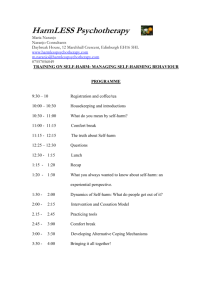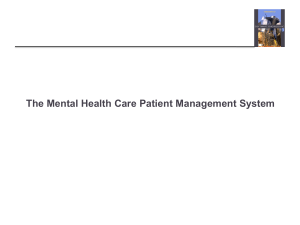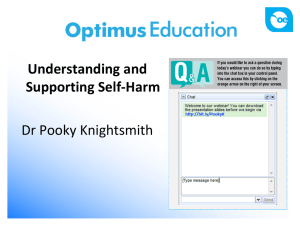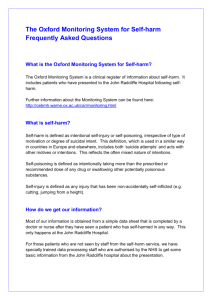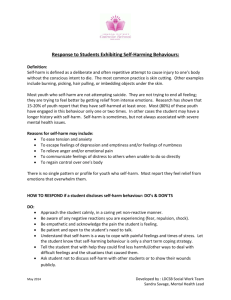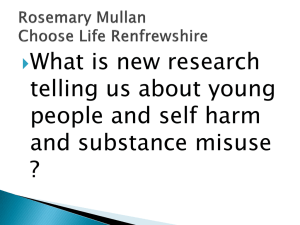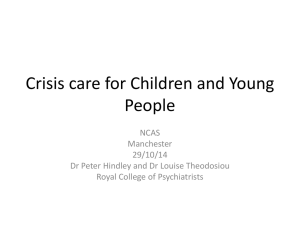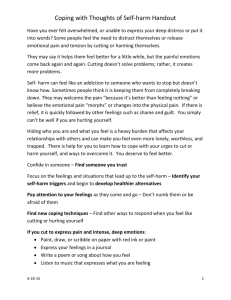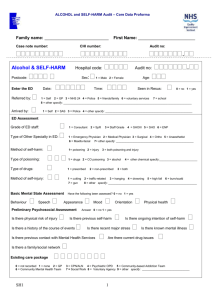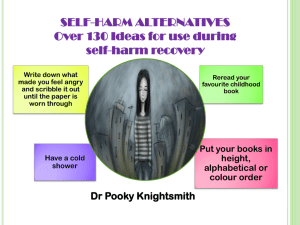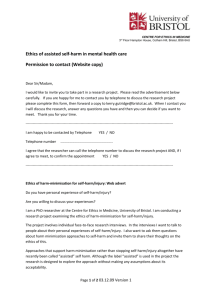Protocol For Responding to Self – Harm in School
advertisement
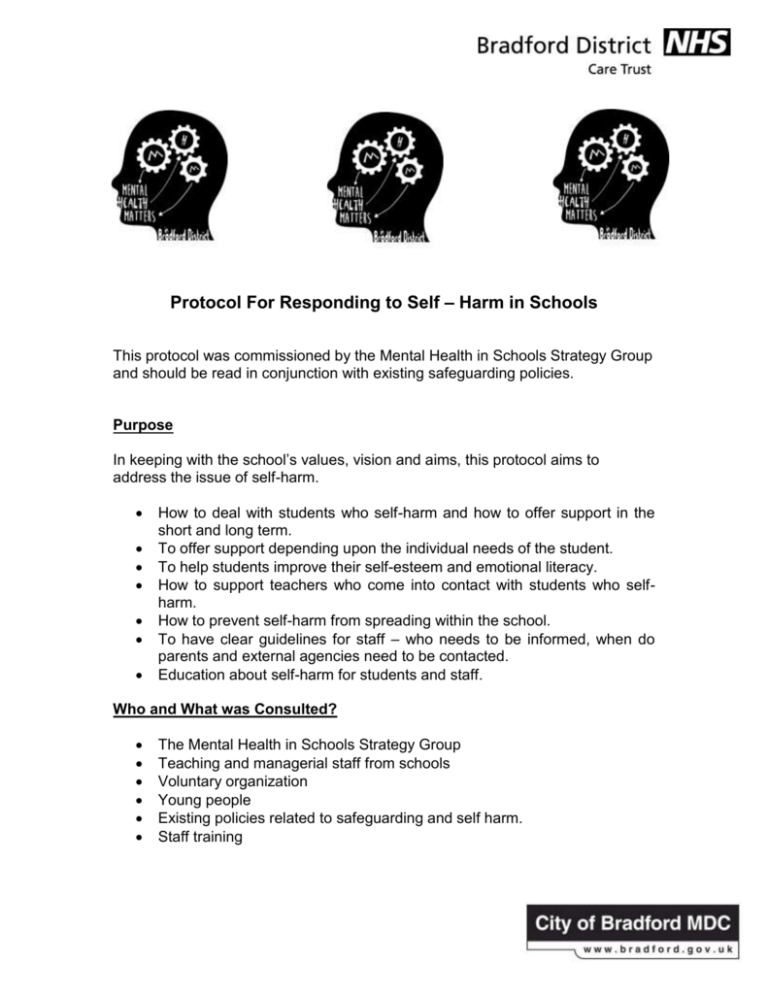
Protocol For Responding to Self – Harm in Schools This protocol was commissioned by the Mental Health in Schools Strategy Group and should be read in conjunction with existing safeguarding policies. Purpose In keeping with the school’s values, vision and aims, this protocol aims to address the issue of self-harm. How to deal with students who self-harm and how to offer support in the short and long term. To offer support depending upon the individual needs of the student. To help students improve their self-esteem and emotional literacy. How to support teachers who come into contact with students who selfharm. How to prevent self-harm from spreading within the school. To have clear guidelines for staff – who needs to be informed, when do parents and external agencies need to be contacted. Education about self-harm for students and staff. Who and What was Consulted? The Mental Health in Schools Strategy Group Teaching and managerial staff from schools Voluntary organization Young people Existing policies related to safeguarding and self harm. Staff training What is Self-Harm? Self-harm is when someone deliberately hurts or injures themselves. It is a continuum ranging from a behaviour which has strong suicidal intent to behaviour which is part of a coping mechanism. It can be used to describe cutting, scratching, burning, taking overdoses, punching oneself, substance abuse, self poisoning, unsafe sex etc. Common Problems Preceding Self-Harm Difficulties with parents / boy or girlfriends / siblings / friends. School problems / bullying Mental health issues e.g. depression, eating disorders. Low self esteem Sexual problems Physical ill health Alcohol / drug abuse Physical / sexual abuse Possible Reasons / Motives Underlying Self-Harm To die To escape from unbearable distress To change the behaviour of others To show desperation to others To get back at other people or make them feel guilty To relieve tension To seek help Roles and Responsibilities of Management Staff and Teachers Appoint a designated person to be responsible for self-harm issues. This could be the safe guarding lead. Ensure that the designated teacher receives appropriate training about self-harm. Ensure that the self-harm protocol is followed by all members of staff. Ensure that self-harm education/awareness is in the school curriculum, e.g school assemblies and that such awareness does not promote of stigmatise self-harm. Consider provisions for students who do self-harm, e.g. long sleeved uniforms and PE kits, time out cards from lessons when a student is experiencing distress. All Staff and Teachers are Expected to: Listen to students who are experiencing emotional distress in a calm and non-judgemental way. Report the self-harm incident to the designated staff member. Need to be clear of the timescale in which this should be done. Do not make promises e.g. assuring confidentiality which cannot be kept. Reassure the student that in order to receive help and find more helpful ways to cope with problems others may need to know. Guide the student towards wanting to make positive changes. Promote problem-solving techniques and non-harmful ways to deal with emotional distress. Provide accurate information about self-harming and awareness about associated mental health problems. Be aware of health and safety issues such as first aid if the incident has occurred in school. The Designated Staff Member Will: Keep accurate records of incidents of self-harm and concerns. Liaise with local services about help available for young people who selfharm. Keep up-to-date information about self-harm, e.g. info leaflets from YoungMinds. Liaise with the student’s Year Head (or Headteacher?). Contact the parents at the appropriate time. Involve the student in this process. Inform the parent about the appropriate help and support that is available for their child. Monitor the student’s progress, e.g. school work, general presentation, following the incident. Know when to seek help to deal with their own feelings and distress. Students Will Be Expected To: Not display open wounds/injuries. These must be dressed appropriately. Talk to the appropriate staff member if they are in emotional distress. Alert a teacher if they suspect a fellow pupil of being suicidal or at serious risk of harm to themselves, and know when confidentiality must be broken. Parents Will Be Encouraged To: Endorse the schools approach education/awareness raising. Work in partnership with the school. to dealing with self-harm and Further information is available from: ChildLine – provides a free national helpline for young people, free confidential advice on a range of problems: 0800 1111 LifeSIGNS (Self Injury Guidance and Network Support) – An online, user-lead voluntary organisation to raise awareness about self-injury and provide information and support to people of all ages affected by selfinjury. National Self-harm Network - UK charity offering support, advice and advocacy services to people affected by self harm directly or in a care role. YoungMinds – provides information and advice on child metal health issues and a Parents Helpline 0800 802 5544. NHS Direct – a helpline with health advice provided provided by NHS nurses: 0845 4647 Samaritans – a telephone helpline and email service for anyone who is feeling upset, worried or suicidal: 0845 790 9090 email: jo@samaritans.org School nurses – Schools can also contact and consult with their designated school nurses to consider making a referral to CAMHS. Written by: Revision date: Mental Health in Schools Strategy Group May 2015
